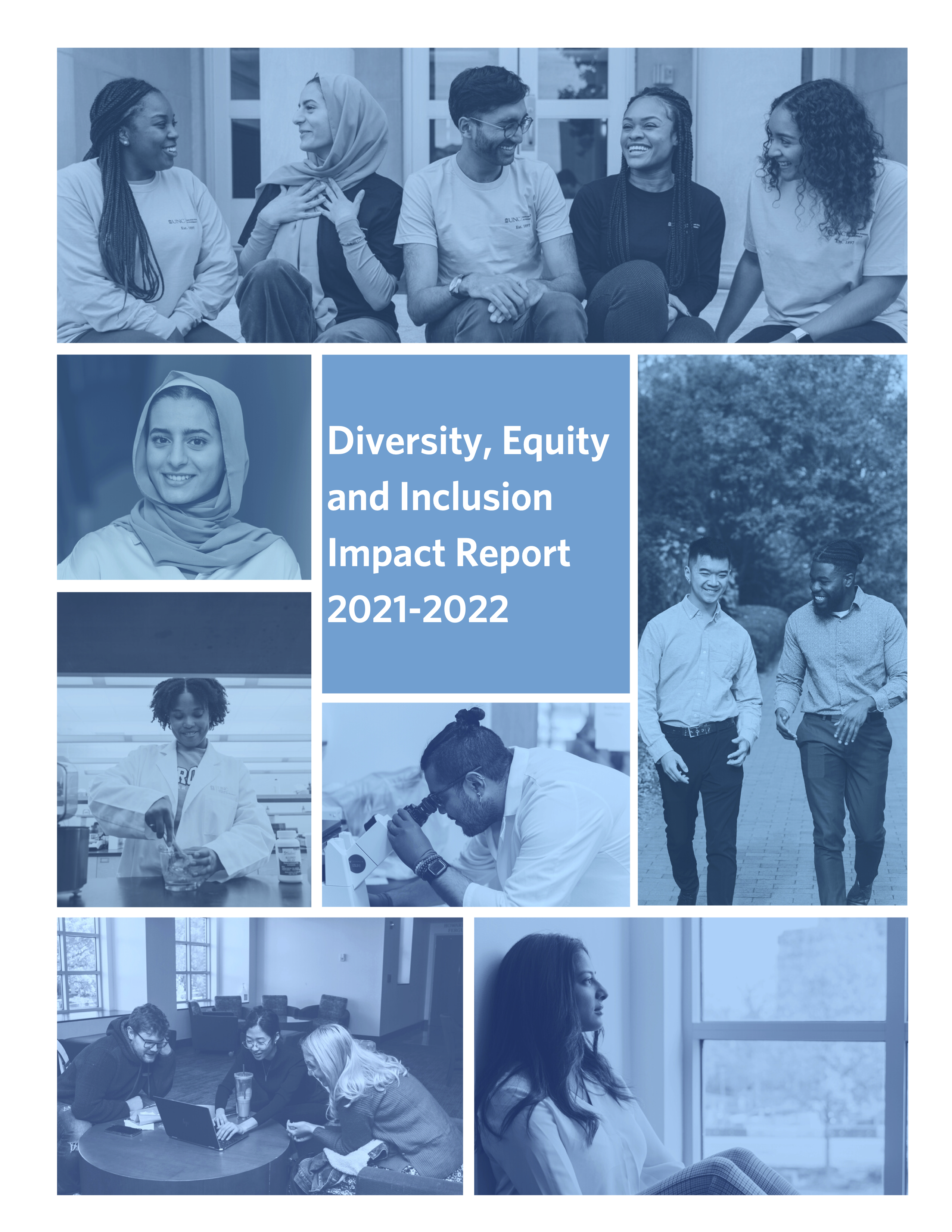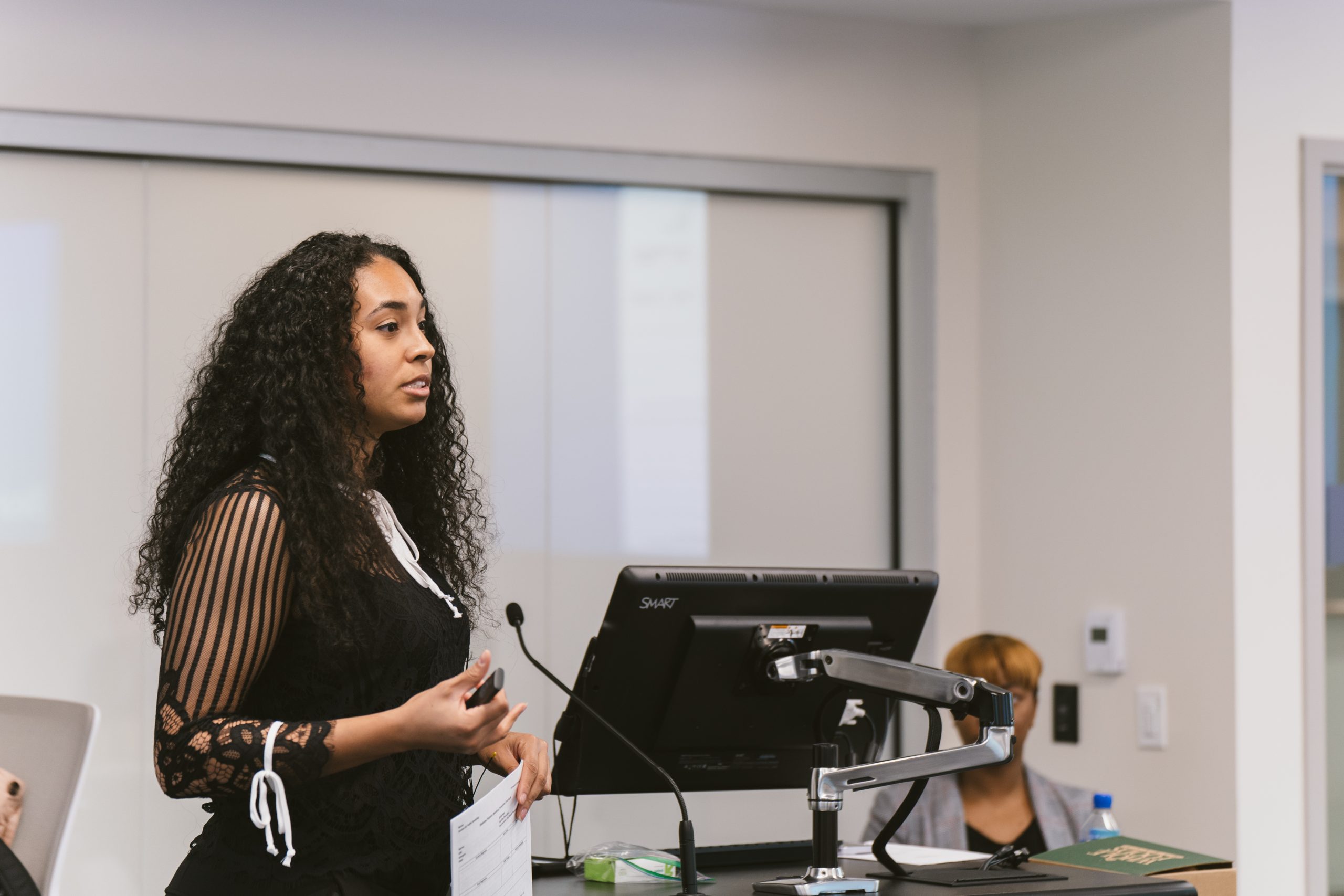Diversity and Inclusion

Why We Care
Hear From Our Students
Hear From Our Faculty
Hear From Our Alumni
Desegregation at the UNC Eshelman School of Pharmacy
Our Vision
The School’s vision is grounded in our aspiration to be a diverse and inclusive community of people to accelerate new thinking and ideas in education, research, and practice that have a positive impact on human health worldwide. We envision a school that reflects, in all its dimensions, the population it serves.
Our Mission
The office’s mission is to leverage diversity and inclusion in the School’s infrastructure to produce meaningful and sustainable change to create a school culture where all are appreciated for who they are and to develop principled leaders that are primed and positioned to solve real-world problems and care for the world.
Our Values
What we are
- A community of people where divergent ideas co-exist, encouraging collaboration where we create our best work.
- A place where diversity and inclusion go hand-in-hand.
- Adaptable and agile people committed to leading in an uncertain, complex, and global world.
What we believe
- Diversity and inclusion: it’s the right thing to do because it’s human.
- Our strengths are rooted in our differences.
- Inclusive leadership and a shared vision make us all accountable and inspires change.
- Diverse perspectives help us innovate at levels that meet a societal need.
- Everything we do begins and ends with a patient in mind.
What We Do
- Create access to opportunities that leave no one behind.
- Build workplaces that leverage diversity of thinking and develop a community where people feel recognized, respected, and appreciated for who they are and what they do.
- Expose students, faculty, and staff to a range of perspectives that encourage them to think broadly, deeply, and critically to solve real-world problems.
- Live globally.
Leading the Way
Social Equity and Inclusion Committee
- Address the diversity, equity and inclusion needs of the School to ensure fair treatment, equity in opportunity, and access to a range of perspectives that encourage students, faculty, staff and postdocs to think broadly, deeply, and critically to impact human health worldwide.
- Implement, monitor, and evaluate the progress of the strategic priorities outlined in the Diversity, Equity, and Inclusion Strategic Plan; and regularly interpret our assessment metrics to disseminate to our community and stakeholders.
- Comprised of alum, faculty, staff, graduate students, and professional students at the UNC Eshelman School of Pharmacy. Chaired by the Associate Dean for the Office of Organizational Diversity and Inclusion, supported by the Director for the Office of Organizational Diversity and Inclusion.
Diversity and Inclusion Pharmacy Alumni Ad Hoc Committee
- Review the School’s D&I strategic plan and provide critical feedback to the Dean and D&I leadership; identify opportunities in priority D&I areas for committee participation, advisement, or support; determine ongoing engagement and next steps to advance the School’s D&I efforts and priority activities.
- Comprised of former and current Pharmacy Foundation and Pharmacy Alumni Association Board members. These dedicated professionals and volunteers represent a collection of diverse perspectives, backgrounds and practice settings of our alumni base. Organized and led by the UNC Eshelman School of Pharmacy Foundation.

View our UNC Eshelman School of Pharmacy Diversity, Equity, and Inclusion Strategic Plan for 2023-24
The following strategic plans were written and completed prior to the Students for Fair Admissions, Inc. v. University of North Carolina Supreme Court decision on June 29, 2023.
Download the Office of Organizational Diversity and Inclusion 2022 Impact Report
View our UNC Eshelman School of Pharmacy Diversity, Equity, and Inclusion Strategic Plan for 2022-23
Download the Office of Organizational Diversity and Inclusion 2022 Impact Report
View our UNC Eshelman School of Pharmacy Diversity, Equity, and Inclusion Strategic Plan for 2022-23
Download the Office of Organizational Diversity and Inclusion 2021 Impact Report
View our UNC Eshelman School of Pharmacy Diversity, Equity, and Inclusion Strategic Plan for 2021-22.
View our UNC Eshelman School of Pharmacy Diversity, Equity, and Inclusion Strategic Plan for 2020-21.
The Educator development series is aimed at preparing our educators to facilitate inclusive teaching and learning. The following reflects the education provided within the School.
- Taking the Difficult out of Difficult Conversations
- CIPhER Preceptor Design Lab: Accessibility in Didactic and Experiential Settings
- Making DEI a Habit in Your Curriculum
- Grappling with Nuance of Integrating race and Gender into Health Science Education
- Creating an Inclusive Learning Environment in the Graduate Education Setting
- Preceptor Design Lab Series: Creating a Racially Inclusive Learning Environment in the Experiential Setting
- Creating an Inclusive Learning Environment in the Residential Setting
- Considerations of the LGBTQIA Community in Creating an Inclusive Learning Environment
- inclusifiED: Inclusive Teaching Practices Workshop
- Asheville African American Health Webinar Series

Seminars
Structural Racism and Health Equity Vibhuti Arya. PharmD MPH
Recorded Presentations
- Black History Month
Slides from Dr. John Clark’s presentation about African American Women in Pharmacy
- Asian Pacific American Heritage Month
Asian Pacific American Heritage Month event recording
Grants
- McKesson LEAD Program ($864,505) – Leading in Excellence, Advancing Diversity, Grant for Mentoring and Recruitment Programs
- Carla Y. White, BS Pharm, RPh (Principal Investigator)
- Genentech Grant ($386,000) – Well-Being Initiative for Woman Faculty of Color to Promote Professional Advancement in Pharmacy and Pharmaceutical Sciences Research
- Carla Y. White, BS Pharm, RPh (Lead Principal Investigator)
- Klarissa Jackson, PhD (Co-Principal Investigator)
- Suzanne Harris, PharmD (Co-Investigator)
- Karla Aghedo (Program Partner) – Founder and CEO, H3W (Houston Wellness Workshops for Women)
- Nuventra Innovation Fellowship ($208,229) – 2 Year Post-Doctoral Fellowship
- ASHP Foundation Board Grant ($2,500) – Healthcare Equity and Leadership (HEAL)
- Frank Tillman II (’19 PharmD) – PGY2 Psychiatric Pharmacy Resident, Department of Pharmacy, UNC Medical Center
- ASHP Pharmacy Leadership Scholars Research Grant ($10,000) – Influencers of career goals and attainment among BIPOC pharmacy trainees
- Caroline Sasser, PharmD, BCPS (Principal Investigator)
- Stephen Eckel, PharmD, MHA (Mentor/Advisor)
- Michael Wolcott, PharmD, PhD (Co-Investigator)
- Kathryn Morbitzer, PharmD (Co-Investigator)
Presentations
Platform Presentations
- Global Perspectives on Cultural Intelligence Interventions in Pharmacy and Pharmaceutical Sciences Education American Association Colleges of Pharmacy Annual Meeting, July 2022.
- Carla Y. White, University of North Carolina at Chapel Hill
- Amanda Storyward, University of North Carolina at Chapel Hill
- Caroline Sasser, University of North Carolina at Chapel Hill
- Louise Brown, University College London
- Lauren May, Monash University
- “Disconnected”: Using Creative Problem-Solving Strategies to Identify and Address Barriers to Rural Experiential Education American Association Colleges of Pharmacy Annual Meeting, July 2022.
- Stephanie Kiser
- Michael Wolcott
- Strategies for Evaluating the Experiences of Underrepresented Learners: Employing QuantCrit Methods American Association Colleges of Pharmacy Annual Meeting, July 2022.
- Kyle Fassett
- Jacqui McLaughlin
- “The Environment Was Just Ice”: From Desegregation to Diversity and Inclusion American Association Colleges of Pharmacy Annual Meeting, July 2022.
- Christian Brown
- Demystifying Critical Theory: Understanding Critical Race, Feminism, and Queer Theories in Pharmacy Education American Association Colleges of Pharmacy Annual Meeting, July 2022.
- Jacqui McLauglin
- Kyle Fassett
- Rethinking Diversity Equity Inclusion Strategy Development in Pharmacy Education (AACP Equity, Diversity, and Inclusion (EDI) Institute, January 2021).
- Carla Y. White, University of North Carolina at Chapel Hill
- Michael Fulford, The University of Georgia
- Communicating with Care and Compassion: A Key to Unlocking Healthcare Disparity (ASHP Specialty Pharmacy Conference: Optimizing Patient Outcomes and Operational Excellence, July 2021)
- Michael D. Wolcott
- Carla Y. White
- Equity in Pharmacy Education: What is Holding Us Back? (AACP Annual Meeting, July 2021)
- Carla Y. White, University of North Carolina at Chapel Hill
- Michael Fulford, The University of Georgia
- Jacqueline McLaughlin, University of North Carolina at Chapel Hill
- Sharon Youmans, University of California, San Francisco
- Malaika Turner, Howard University
Mini/Micro Sessions
- Building a Diverse Pharmacy Workforce During a Pandemic (AACP Interim Meeting – INclusion 2021, March 2021)
- Carla Y. White, University of North Carolina at Chapel Hill
- Can You Hear Me Now? A Class Activity About Interprofessional Communication and Micro/Macroaggressions in Healthcare (AACP Annual Meeting, July 2021)
- Philip Rodgers, University of North Carolina at Chapel Hill
- Charlene Williams, University of North Carolina at Chapel Hill
- Creating an Inclusive Learning Environment: Experience with a Faculty Development Series (AACP Annual Meeting, July 2021)
- Kathryn Morbitzer, University of North Carolina at Chapel Hill
- Suzanne Harris, University of North Carolina at Chapel Hill
- Developing Inclusive Leaders: Incorporating Diversity, Equity, and Inclusion Into Pharmacy Student Leadership Training (AACP Annual Meeting, July 2021)
- Jacqueline Zeeman, University of North Carolina at Chapel Hill
- David Steeb, University of North Carolina at Chapel Hill
Posters
- Understanding Cultural Intelligence: Evaluating Pharmacy Preceptors’ Experiences and Self-efficacy (AACP Annual Meeting, July 2022)
- Lana Minshew, University of North Carolina at Chapel Hill
- Charlene Williams, University of North Carolina at Chapel Hill
- Carla Y. White, University of North Carolina at Chapel Hill
- Kyle Fassett, University of North Carolina at Chapel Hill
- Jacqui McLaughlin, University of North Carolina at Chapel Hill
- A Pharmacy-led Approach to Address Social Determinants of Health in College Students (ASHP Annual Meeting, March 2022)
- Alexis Shook, University of North Carolina at Chapel Hill
- Macary Marciniak, University of North Carolina at Chapel Hill
- Evaluating Faculty Cultural Intelligence Self-Efficacy at UNC Eshelman School of Pharmacy (AACP Annual Conference July 2022)
- Jacqui McLaughlin, University of North Carolina at Chapel Hill
- Kyle Fassett, University of North Carolina at Chapel Hill
- Carla Y. White, University of North Carolina at Chapel Hill
- Incorporating Cultural Intelligence into Doctor of Pharmacy Class Sessions, Courses, and Curricula: Introducing a Framework (AACP Annual Meeting, July 2021)
- Lana Minshew, University of North Carolina at Chapel Hill
- Diana Lee, University of North Carolina at Chapel Hill
- Preparing Faculty and Preceptors to Create an Inclusive Learning Environment (AACP Annual Meeting, July 2021)
- Kathryn Morbitzer, University of North Carolina at Chapel Hill
- Jacqueline McLaughlin, University of North Carolina at Chapel Hill
- Carla Y. White, University of North Carolina at Chapel Hill
Panels
- Diverse Paths to Leadership: A Panel Discussion with Current Leaders in the Academy (AACP Annual Meeting, July 2021)
- Cynthia Warrick, Stillman College
- Anne Lin, Notre Dame of Maryland University
- Oscar Garza, The University of Louisiana Monroe
- Carla Y. White, University of North Carolina at Chapel Hill
- Thomas Smith, Manchester University
Continuing Education and Certificate Programs
Rethinking Diversity, Equity, and Inclusion Strategy Development in Pharmacy Education – ASHP
- Carla Y. White, University of North Carolina at Chapel Hill
How does intersectionality intersect with me? – ASHP
- Michael D. Wolcott, University of North Carolina at Chapel Hill

Awards and Recognitions
- 2022 Leaders in Diversity Award (Triangle Business Journal)
- UNC Eshelman School of Pharmacy
- 2020 Leaders in Diversity Award (Triangle Business Journal)
- Carla White – Associate Dean, Organizational Diversity and Inclusion
- 13th Annual Alumni Diversity Awards (University Office for Diversity and Inclusion)
- Frank Tillman II (’19 PharmD) – PGY2 Psychiatric Pharmacy Resident, Department of Pharmacy, UNC Medical Center
- Janet Edwards (’95, BS, Pharmacy) – Senior Account Specialist for Respiratory Biologics, GlaxoSmithKline
- Accessibility Resources and Services
- American Indian Center
- Asian American Center
- Carolina Grad Student F1RSTS
- Carolina Latina/o Collaborative
- Community Culture and Climate Improvement Tool
- Office for Diversity and Inclusion
- Eshelman Care Team
- Equal Opportunity and Compliance Office
- Gender-Inclusive Language (UNC Writing Center)
- HAVEN
- Global Grads
- Implicit Bias: Further Reading
- International Student & Scholar Services
- The Learning Center
- Lesbian, Gay, Bisexual, Transgender, & Queer (LGBTQ) Center
- LGBTQIA+ Health Guide (UNC Health Sciences Library)
- Sonya Haynes Stone Center for Black Culture and History
- Veterans Resource Team
- WE RISE – Welcoming Ethnic and Racial Inclusion for Student Equity

PRIME a framework developed within the office of organizational diversity and inclusion that guides the engagement practices of our School community.

Contacts
The Office of Organizational Diversity and Inclusion
 Carla White
Carla White
Associate Dean, Organizational Diversity and Inclusion
Clinical Assistant Professor
Carla@unc.edu
(919) 966-7571
 Amanda Storyward
Amanda Storyward
Director, Organizational Diversity and Inclusion
amanda.storyward@unc.edu
(910) 916-5615


